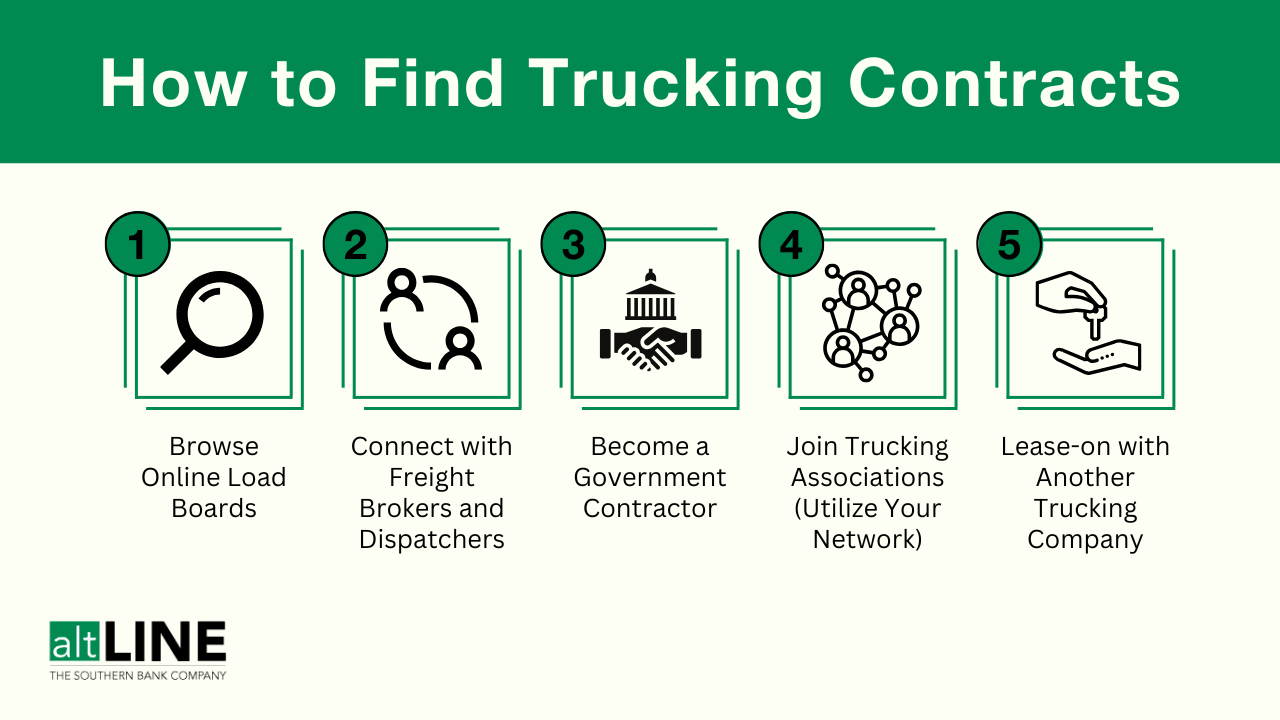Last Updated August 27, 2025
Turn your unpaid invoices into working capital for your business
Deciding to start a trucking company can feel like a leap of faith. As an owner-operator, you’re embracing the flexibility and hard work of a life on the road. While purchasing or leasing a truck is an important first step, you also need clients to stay in business.
Business might be slow initially, but demand for truckers is at an all-time high. In fact, the U.S. is set to have a shortage of 162,000 truck drivers by 2030. Whether you’re trying to secure freight contracts for owner-operators, box truck contracts, or even government trucking contracts, it’s essential to realize just how many opportunities you have as a truck driver.
Check out this guide for actionable tips on getting contracts for trucking and setting fair rates for your business.
How to Find Trucking Contracts
With so many carriers seeking stable business, you need to answer the question, How do they find loads to haul? If you’re looking for more trucking contracts, follow these 9 tried-and-true ways to find profitable work.

1. Browse Load Boards
Curious about how to get loads?
Load boards are the first place you should look. These are digital platforms that connect owner-operators with shippers who need trucking services.
The best load boards offer detailed information on each freight contract, helping you decide which jobs you want to take. However, the quality of the load board matters. Check out these reputable load boards to spot legitimate opportunities:
Many load boards offer free membership tiers, although paid memberships will give you access to higher-paying contracts.
2. Connect With Freight Brokers
Freight brokers act like matchmakers who help drivers find loads. The downside is that freight brokers charge for their services, but many new trucking companies use brokers to get paying work, fast.
Building strong relationships with freight brokers means you’ll get consistent work and possibly even preferred rates. Clients want to work with experienced, trustworthy truckers, so successfully completing a few jobs could help you score higher-paying work down the line.
However, be careful when working with freight brokers. Not every company operates with integrity and in compliance with important laws, so only work with established, reputable companies. Checking a broker’s credit score is a surefire way to see if your broker is legitimate.
3. Hire Dispatchers
If you’re busy managing the ins and outs of driving, consider hiring a back-office dispatcher to take administrative tasks off your plate. Dispatchers can help optimize delivery routes, but they do so much more, including:
- Rate negotiations
- Finding loads
- Managing paperwork
Not only does the dispatcher help you find paying work, but they also streamline processes and reduce the tedium of bureaucracy.
Related: Freight Brokers vs. Dispatchers
4. Become a Government Contractor
Government freight contractors receive stable, often lucrative work. It isn’t easy to secure government contracts for trucking, though. There’s a competitive bidding process, and you have to meet a list of criteria.
Even so, it’s worth applying as a government vendor because these jobs are lucrative and provide consistent work. To do so, you’ll need to:
- Register with the System for Award Management (SAM)
- Request a Contractor and Government Entity Code
- Generate a UEI number
- Apply for status as a disadvantaged business, if applicable
If you’re struggling to find loads to haul, you should learn how to get government freight contracts because it can significantly boost your company’s cash flow and increase profitability.
5. Join Trucking Associations
Professional trucking organizations have a lot of resources—and some of those resources could score you paying jobs. Trucking associations give owner-operators access to industry insights and opportunities to meet other business owners at regular events.
Consider joining some of the biggest trucking associations in the United States, including:
- American Trucking Associations
- Women In Trucking
- National Association of Independent Truckers
- Trucking Industry Defense Association
- National Association of Small Trucking Companies
You might not score work right away, but regularly participating in a trucking association will put your name out there as a trusted contact. You never know when a valuable connection could lead to hauling contracts and referrals.
6. Utilize a Trucking Network
Trucking networks might sound similar to trucking associations, but they’re a little different. Networks are more job-focused. It isn’t unusual for trucking networks to post job listings, offer members-only opportunities or load boards, and refer members to paying partnerships.
7. Further Work With Existing Clients
Happy clients are important for any new business, but they’re especially crucial for truckers. Strong client relationships lead to repeat business and referrals, which is crucial for scoring ongoing work.
At a minimum, offer timely, clear communication and fulfill your client’s requests. Going above and beyond, like delivering ahead of schedule, is also a great way to make a name for yourself and potentially score more freight contracts.
It might feel awkward to ask, but it can’t hurt to touch base with past clients a week or two after a project wraps up. Ask the client if they have additional loads planned or if they would be willing to refer your business to their contacts. The worst thing they can do is say no, so the reward of asking outweighs the risk.
8. Lease-On With a Trucking Company
Leasing-on is a smart way to dip your toes into trucking with less stress. With this option, you partner with an established company as an owner-operator.
You will benefit from the company’s existing trucking contracts while learning how to get trucking contracts for your own business in the future. Consider leasing-on as a soft launch that provides stability and experience before you go off on your own.
9. Explore the Spot Market
Have you tried using spot market freight rates before? Check spot load boards to find last-minute trucking contracts. Shippers are often willing to pay competitive rates for the spot market because they’re in a hurry. Many load boards list spot rates, although platforms like DAT offer specialized spot rate listings to subscribers.
This option is ideal if you need high-paying work ASAP, since most loads are available for immediate pickup. Spot rates are also great for filling any gaps in your schedule. Plus, you never know when a satisfied spot freight client will become a regular customer.
Interested in Factoring?
Turn your unpaid invoices into working capital so you can keep growing your trucking business.
What Owner-Operators Should Take Into Account When Finding Contracts
Finding contracts is incredibly important, but securing paying work is just one side of the equation. You also need to consider how much it costs to start a trucking company, not to mention how you’ll handle the logistics. Consider these factors when choosing trucking contracts.
Anticipated Costs
The expenses that come with running a trucking company will cut into potential earnings. You may have less overhead than an enterprise fleet, but you still need to consider expenses when bidding on projects. If you undercut yourself with low rates, you’ll potentially put your business in the red.
Most trucking companies express expenses as an average cost per mile. By calculating cost per mile, you look at your total expenses by miles driven. This includes gas, salary, financing, load board memberships, regulatory fees, and other business expenses.
The majority of trucking contracts dictate the price per job. As a business owner, you must ensure the payment terms work for your business. Not all contracts are a good deal, so consider your expenses and expected profit margins to choose the most profitable routes for your trucking business.
Payment Terms
Always double-check the payment terms for trucking contracts. Some clients stipulate net 30 payments, for example, which means you won’t be paid for your work for a month.
Clarify when clients will make payments, whether upon completion or bi-weekly. Most trucking contracts will stipulate this, but remember, you have the freedom to push back in many cases. If the payment terms don’t work for you, ask the client to revise them before signing a contract.
Location and Route-Planning
Don’t take every trucking contract you see. The contract needs to make sense for your business and capabilities. If you’re in Albuquerque right now, there’s a low chance you’ll be able to accept a spot freight job in New York City.
Hire a dispatcher to secure trucking contracts matching your preferred routes. This minimizes costs and helps you run a more efficient business. After all, fuel, tolls, and truck wear and tear are much more expensive for long or complex routes.
Make sure your routes are profitable and logistically feasible. Careful planning will help you complete deliveries in less time and give clients a better experience—it’s a true win-win.
In-Summary: How to Get Freight Contracts
Securing freight contracts as a new owner-operator takes time. You’ll need to visit load boards, network with brokers or other drivers, know how to effectively market your trucking company, and do plenty of paperwork in the early stages of your business. While online load boards and the spot market are great for securing jobs, don’t overlook the value of networking and building relationships. Whether it’s clients, brokers, or other drivers, the right connection is usually the key to profitable jobs that keep your business moving.
Michael McCareins is the Content Marketing Associate at altLINE, where he is dedicated to creating and managing optimal content for readers. Following a brief career in media relations, Michael has discovered a passion for content marketing through developing unique, informative content to help audiences better understand ideas and topics such as invoice factoring and A/R financing.









